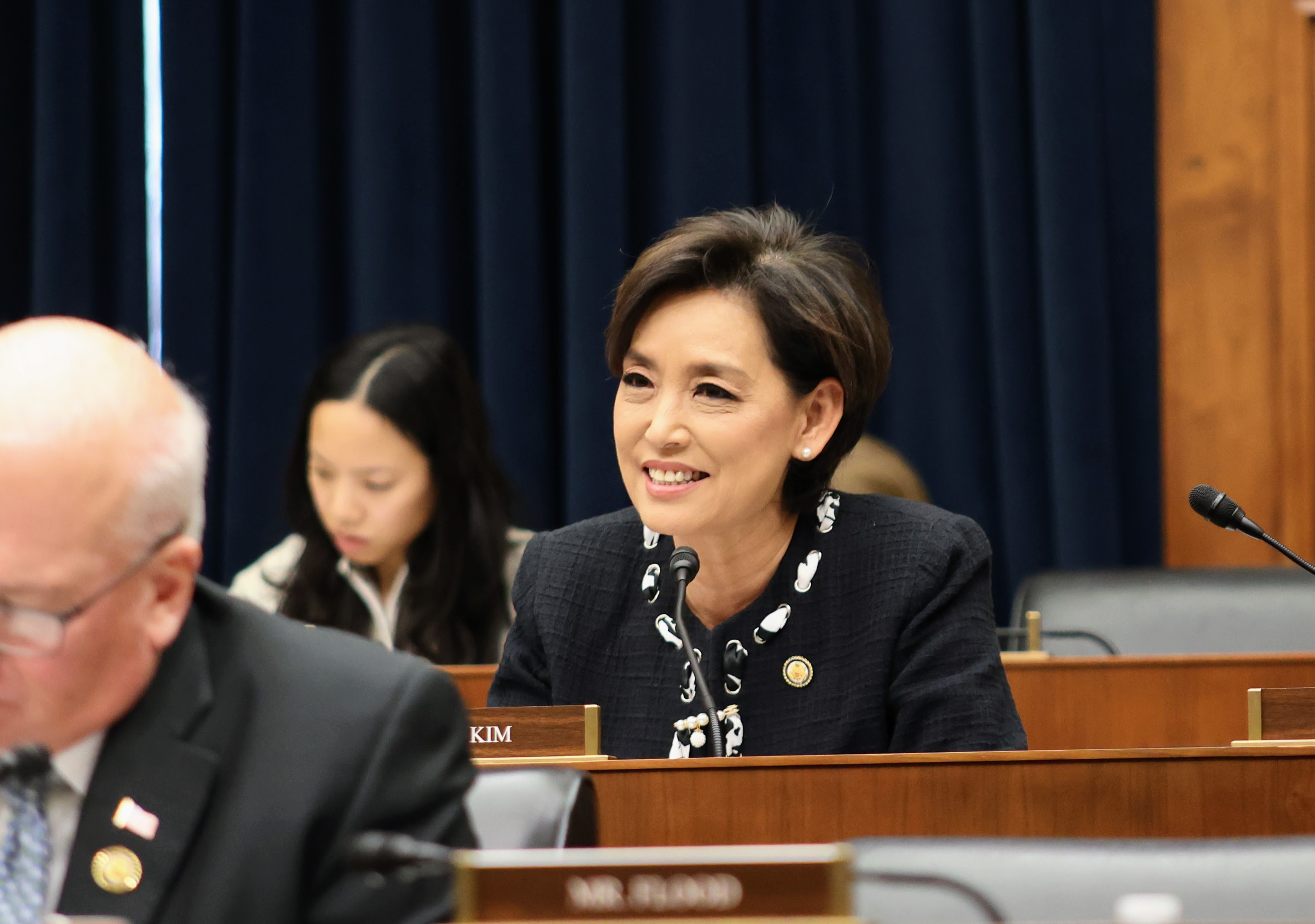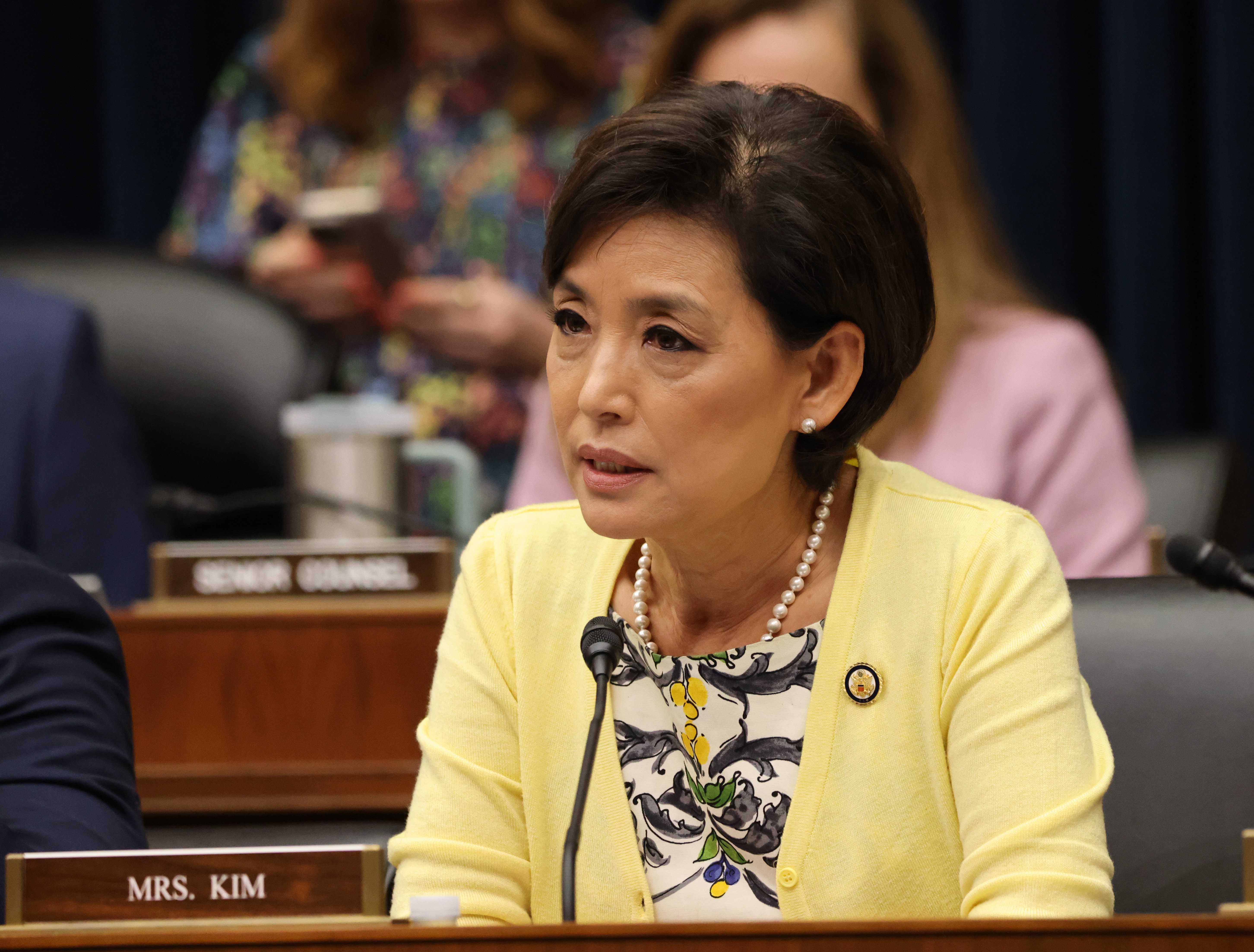Energizer Bunny status, showdowns at the family pingpong table, representing California’s 39th District in Congress — Rep. Young Kim shares much in common with her former boss, Ed Royce.
She worked in his Orange County office for two decades, long enough for her kids to start calling him “Uncle Ed.”
Now, as one of two Korean American Republicans elected to the House last cycle (the other is her friend Michelle Steel), Kim is drawing on her experience as an immigrant amid a changing political party.
“I see the future of our party — the fact that I’m elected, the fact that Michelle is elected,” she said in a phone conversation last week.
Q: How did you get your start working for Royce as his director of community relations?
A: It takes me back to 1990. My second daughter was born, and I was staying home getting ready to return to my work. My husband ran a nonprofit called Korean American Coalition and had known Ed Royce, then a state senator, for a number of years.
At one of the events, I remember talking to him, like, “Oh, what are your hobbies?” His eyes lit up. “You’ve read Atlas Shrugged? That’s like thousands of pages.” I said, “Yes, I read it in high school,” and two days later, I got a call: “Young Kim, would you consider working with me?” Wow. I never expected it.
Before I knew it, I was working in his state Senate district office. He basically said, “You and your husband are well connected in the Asian community, and I would like to ask for your help in getting me more involved.” So that’s how I started. And then two years later, he ran and won the 39th Congressional District, so I naturally moved to work with him.
He was a member of the Foreign Affairs Committee the entire time he served. It allowed me to further expand the opportunity for a very diverse district like ours — the Asian American community makes up one-third of the population — by forming APCAC, which is the Asian Pacific Congressional Advisory Council.
Q: You hosted a radio and TV show as part of your outreach. What was that like?
A: I hosted a weekly talk show on local station KSCI, now it’s called LA18. I would invite a guest who would talk about the importance of U.S.-Asia relations or anything related to the Korean community. It helped me personally to hone my ability to speak Korean fluently, because I had to speak in Korean.
But at the same time, it was bilingual, so I could also speak in English and have a Korean subtitle. [Sometimes I brought Royce] as my guest to talk about what he was working on in Congress.
Serving the community, I guess it was implanted in me and it’s now part of my DNA. As an immigrant, my mother used to tell me, “You’ve got to give back to this community and the country that has given us so many opportunities.” And that’s also what Ed Royce encouraged me to do. He really entrusted women to help him in his work in key positions.
He continues to be my mentor, my adviser, biggest cheerleader. We talk on a regular basis. I am very proud to say now we have a long-term friendship. Because I worked for him for a long time, my kids grew up calling him “Uncle Ed.” He would come over to our house and play pingpong in our garage.
Q: What were some ways you could jump into legislation, even as a district staffer?
A: We got the idea of extending the Radio Free Asia program, much like Radio Free Europe. It had been congressionally reauthorized year after year. Can you imagine the morale at RFA if Congress doesn’t reauthorize their funding? You may not have a job.
We heard from people in the Vietnamese and Korean communities working on human rights issues who used Radio Free Asia to get the information back into rogue nations. So we said, “We need to make the RFA operation permanent.” That’s one piece of legislation that I’m proud to have been a part of.
Also, because we have a lot of defectors, North Korean refugees, in our district, that became a big issue. So I was able to help [Royce] push through the North Korea human rights legislation in 2004 and its reauthorization.
I left his office to run for my state Assembly race in the election of 2014. Now, bringing back to today, I serve on the Foreign Affairs Committee and the Asia subcommittee.
When I was first running [for Congress] in 2018, there was a National Journal article that, the title was like, “Young Kim’s run for Congress was 20 years in the making.” [Laughs.] I mean, I never thought that I’d be running for this seat or run for any office to begin with.
Q: Since you were a longtime aide before you ran for office, did you ever get the sense that you had to “wait your turn” to run?
A: No, never. First of all, I never thought Ed Royce would retire. [Laughs.] Everybody was so sad to see him go because he did such a great job. If anything, he encouraged me when there was an opportunity to run for state Assembly. In 2012, he sat me down — I thought it was just a regular conversation — and said, “We need to find a candidate to run against this Democrat state Assembly member” who had just won. She hadn’t even been sworn in to office yet. He said, “We need to find somebody and somebody fast so we can start working on this.” And I said, “Sure, I will look for somebody.” And he said, “No, look no further — you will be great.” I’m like, “Huh?”
So he was always an encourager, and he was always an Energizer Bunny. He would come back to the district, and from the moment I’d pick him up from the airport, we were on our way. On the weekends, we’d be doing at minimum six events. Later, he would tell me, “I thought I was the hardest working member of Congress, but you have the energy — you are the Energizer Bunny now!”
Q: What’s one habit you had as a staffer that you still have today?
A: Once a staffer, always a staffer. Every time I talk to [Royce], I immediately go back into staff mode. “What can I do for you? Do you need anything? Do you have everything? Do you need anything more? You got my number, or text me or email me.” I mean, to this day, every time I talk to Ed, it just goes back into that, but now, the tide has changed.
Looking at my staff now, they are working around the clock. My expectation of them is, do what you are asked to do in your given position, but also, remembering my own days, don’t cut yourself short. Always go beyond.
Q: What barriers do you see for Asian Americans getting involved in politics now?
A: There are just too few of us, especially Republicans. It’s a generalized perception that the Democratic Party is more sympathetic to the immigrant community. But if you know the policies that they work on, that is not necessarily the case.
People who fled communism, people who fled socialism, they come to America for democracy, freedom, individual responsibility. The word “Democrat” — I think they equate that with democracy. And then as they assimilate into this country and start businesses, become successful entrepreneurs, they realize, “Oh my god, the higher taxes, higher minimum wage increases, all of these are harmful to us.”
The younger generations, like my kids’ generation, who are born and raised in the United States, they get their information from the internet, and they tend to be more liberal-minded. But the older generations — you have experienced the Korean War, you have escaped the killing fields in Cambodia, you escaped communism and socialism from Vietnam and other countries. They tend to be more conservative.
Q: What is different about California and the GOP that led you to win this cycle, after losing in the previous one?
A: You know, our party is changing — for the first time in so many years and so many decades. Two years ago, we elected the first Latina female, under 40, to be the chairwoman of the California Republican Party. We elected a Taiwanese American as a vice chair. And for the first time ever, we have a national committeewoman who is an Indian American. The state is changing.
Even though the state is turning, with more Democrat registration, I don’t think … the Republican Party is really going down. A lot of people talk about it, but look, the fact that Michelle and I and so many other women, minority groups, even veterans from different ethnic backgrounds, were elected, it really shows there is promise.
You are a minority woman, you are an immigrant, therefore we’re going to have you run for office — that’s probably what the Democrats are looking for. But for us, the Republican Party, we value talent, quality and individual responsibility.
So I see the future of our party — the fact that I’m elected, the fact that Michelle is elected. The fact that so many minority women are elected. There is hope.
Q: What advice do you have for staffers, particularly women, thinking of running for Congress one day?
A: Be confident. When the opportunity comes, go for it. Don’t ever hide behind your gender and think, “Oh, I can only do so much.”
If there is a trail in front by somebody who has done it before — like me, like Michelle — follow that path, but leave your own trail along the way for others to follow. Someday, they may run for office too, and we will be serving together. You never know. Like I did.




